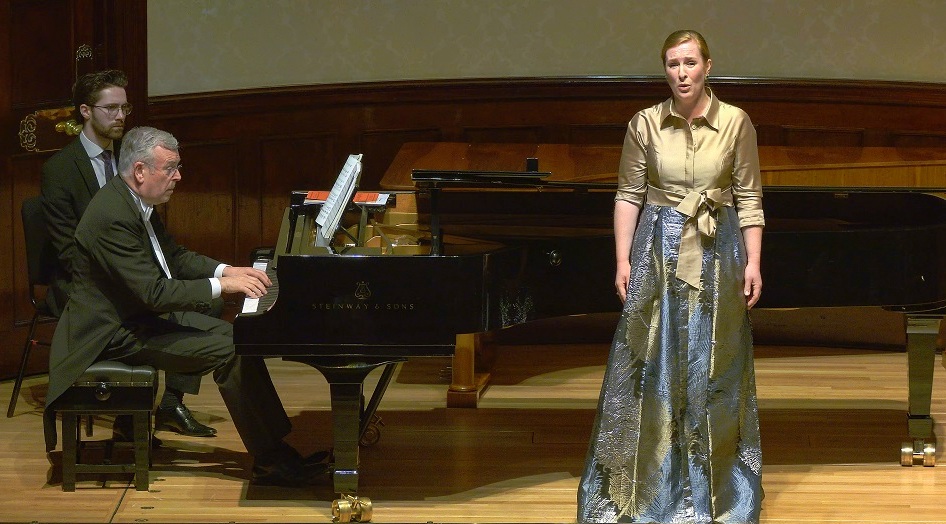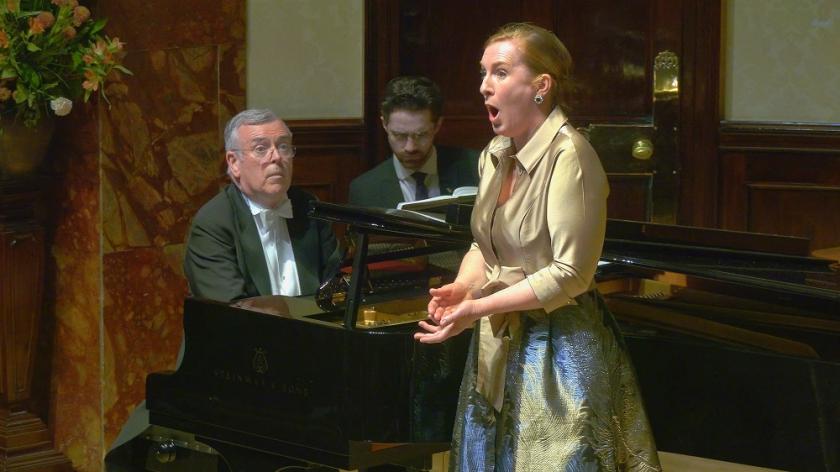Peerless among the constellation of Irish singers making waves around the world, mezzo Paula Murrihy first dazzled London as Ascanio in Terry Gilliam’s English National Opera production of Berlioz’s Benvenuto Cellini. Since then she’s become a major star on the continent, not least as a superb Octavian in Strauss's Der Rosenkavalier, less so in the UK, though that should have changed with her Proms appearance last year as Didon in Les Troyens.
The Wigmore Hall hardcore don’t seem to have got the message – last night’s concert, far from being the sellout it should have been, was relatively sparsely populated – but the mixed audience made up for that with its joyous reception of an already great artist.
The pleasure was doubled in the consummate partnership of an unsurpassed pianist for singers, Malcolm Martineau, who seemed to take great delight in his mezzo’s infinite variety and even sat on the piano stool, rapt, to listen to her poised delivery of a traditional Donegal song in Irish as unaccompanied encore.:"Dónal Óg" (Murrihy's spoken introduction was music, too)..The feckless young fellow disappointing his sweetheart might well connect with Auden's and Britten's Johnny, who "frowned like thunder" and "went away" despite excessively high hopes from his beloved, and no doubt with input from Martineau's immense experience in Britten – he curated a wonderful weekend of all Britten's songs with piano at Aldeburgh – she made connections, too, between the first and second, then the third and fourth, of the late-1930s Cabaret Songs.  If I start near the end rather than the perfumed beginning of the recital, it's because the Britten was the biggest surprise of the evening, a masterclass in transformation – how to get the laughs with a Julie-Andrews-clear clipped diction when necessary, accompanied by expressive hand gestures, but to underline the sadness even in the usually camped-up "Tell me the Truth About Love". And Johnny's responses to a host of situations felt epic.
If I start near the end rather than the perfumed beginning of the recital, it's because the Britten was the biggest surprise of the evening, a masterclass in transformation – how to get the laughs with a Julie-Andrews-clear clipped diction when necessary, accompanied by expressive hand gestures, but to underline the sadness even in the usually camped-up "Tell me the Truth About Love". And Johnny's responses to a host of situations felt epic.
If we didn't catch every word of Howells's "King David" – text not reproduced in the programme for copyright reasons – the birdsong episodes proved riveting, and here was another ballad to bookend less complex songs. And Murrihy has such a gift to be simple, backed up by perfect technique, that Vaughan Williams' very familiar "Linden Lea" felt utterly fresh and free – again, the partnership with Martineau paid dividends – and the four songs selected from Irish composer Ina Boyle's Looking Back, penned shortly before her death in 1967, stilled any questions about originality with the poetic essence so finely conjured, especially in the two timeless numbers about quiet and sleep.
Murrihy's ease in moving between white-note slivers of sound and a vibrato that's full and impassioned but never over-spread, plus a top that any soprano might envy, established itself at the beginning of Debussy's Chansons de Bilitis. Far from being the merely "wispy" embodiment of French song – Anna Russell's wicked mockery has made it difficult to get that idea out of one's head – the shifting Arcadian landscape so vividly conjured by Martineau receded in the face of erotic passion – dreamlike, then real – in "La chevelure".
The high summer noon of the recital, though, had to be Berlioz's Les Nuits d'été. Here are some of the most searing, poignant refrains in the entire repertoire; Murrihy gave us their full tonal variousness in the very heart of the cycle, the lament of "Sur les lagunes" and the tearful beauty of "Absence", which may well equal Mahler's "Ich bin der Welt abhanden gekommen" as the most beautiful song in the world. As for the billows of "L'île inconnue", the concluding song of the sequence, we thought that the breeze had already transported us enough, but it was to take us to unexpected places after the interval. Perfect song programme, perfect pianist, perfect singer.














Add comment